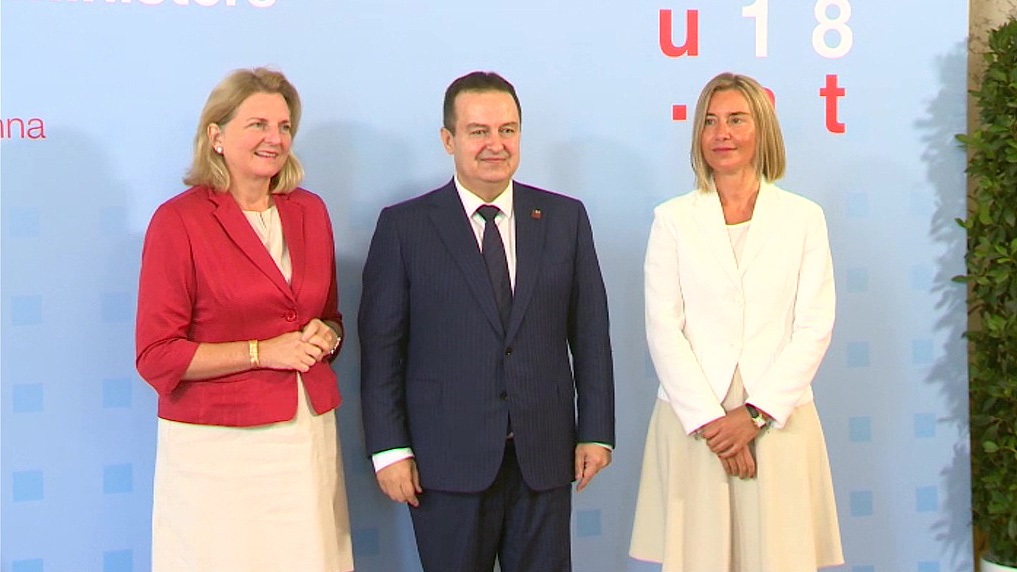



| Friday, 31 August 2018. | |
| Minister Dacic: " Serbia is counting on the strength of multilateralism as the legacy of our contemporary society, deeply believing in dialogue and compromise reaching even in the most difficult situations." | |
| + larger fontnormal font- Smaller font |
 Statement By First Deputy Prime Minister and Minister of Foreign Affairs Ivica Dacic at Informal Meeting ("Gymnich") of EU Foreign Ministers and Candidate Countries. Statement By First Deputy Prime Minister and Minister of Foreign Affairs Ivica Dacic at Informal Meeting ("Gymnich") of EU Foreign Ministers and Candidate Countries.Ladies and Gentlemen, Dear colleagues, First of all, allow me to thank Mrs. Kneissl and EU High Representative Mrs. Mogerini for their invitation. I am pleased that we have yet another opportunity to discuss again in the format enabling direct and open exchange of views among EU members and candidate countries. Let me thank Austria, which currently holds the Presidency of the Council of the European Union, for organizing this meeting. We would like the Austrian Presidency to be remembered as a period when Serbia opened a large number of chapters in its accession negotiations with the EU. I would therefore like to take this opportunity to urge you to support us in opening new chapters. Under the Commission's Enlargement Strategy, the year 2025 has been defined as an indicative date for Serbia's accession to the European Union acknowledging that the Republic of Serbia and Montenegro are frontrunners in this process. Let me reiterate once again that Serbia views its European Union membership as its major strategic commitment. We believe that the Union, for its part, is also strategically committed to turning our continent into a safer place by making Serbia and our region its integral part, enabling us to work together in the international arena to advance effective multilateralism. Taking stock of the dynamic developments at the global political scene, the Republic of Serbia perceives the show of force in international relations again and erosion of norms and principles as a warning to all of us. Effective multilateralism is one of the strategic goals that the EU advanced in the 2003 European Security Strategy and the 2016 Global Strategy as a response to unilateralism and it implies trust in international institutions, rules and partnerships including burden-sharing among all participants. Serbia also embraces such approach and by its activities in international and regional organizations and initiatives, taking into account its future EU membership, seeks to contribute to the strengthening of peace and stability as well as to economic progress. It is necessary to expand multilateral arrangements beyond trade and security to include disarmament, arms control and international criminal law. I hold the view that multilateral cooperation with other actors on the international stage is of vital importance. We deeply believe that this is the only way forward in a world of growing interdependence and complexity where common challenges require common solutions. We are aware of the challenges facing the EU – perennial economic problems, migration crisis, terrorism, reaching an agreement on climate change and the UN Security Council reform, as well as trade liberalization in the context of the World Trade Organization. These challenges are the reason for us to unite and express readiness for coordinated responses and cooperation. Serbia is aware of the importance of multilateral cooperation, but also of the fact that this type of cooperation is challenging. This is best witnessed by our own experience from the not too distant past. It is well-known that the UN mission is active in our southern Province. Serbia is fully aware of the challenges facing the peace-keeping missions and, along with its partners, it is willing to work to improve their operational capacities. We are also willing to increase our participation in peace-keeping missions, thus making our contribution to the preservation of international peace and security. Unilaterally declared independence of Kosovo and the current situation in the Province present the biggest security challenge for the Republic of Serbia, bearing in mind the discrimination against and violence to which persons belonging to the Serbian community in Kosovo and Metohija are exposed, as well as endangerment of Serbian cultural and historical heritage. Signing of the Brussels Agreement was motivated by the desire to examine possibilities for a systematic, institutionalized protection of the interests of Serbian and other non-Albanian communities in the Province, short of the proper institutional mechanisms in place. Under the Agreement, the protection is to be ensured through the Community of Serb-Majority Municipalities, which five years later has still not been established, showing why the support of the international community is vital for a successful dialogue. I expect all the participants in the process to be engaged in confidence-building, because without trust it will not be at all easy, or possible, to build a better future. We need to continue the dialogue in good faith, since it is a necessary prerequisite for stability and security in our region. It is precisely from the example of our southern Province that one can perceive the importance of trust in multilateralism and its institutions, either in the UN, as the largest one, or in some other regional multilateral format, because we all need to work on ensuring more trust among the citizens, regardless of their ethnic background. Without this, multilateralism has no purpose. Today we are witness to the fact that unilateral decisions in international setting lead to perilous instability and result in great collateral damage. It is for this reason that the multilateral approach to problem-solving is a means to avoid arbitrary action, which can have long-term consequences. Serbia is counting on the strength of multilateralism as the legacy of our contemporary society, deeply believing in dialogue and compromise reaching even in the most difficult situations. Thank you. |